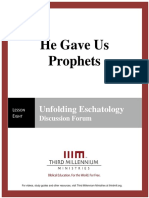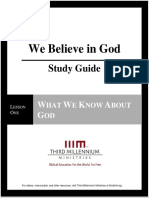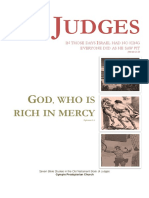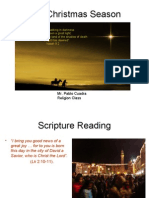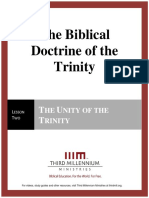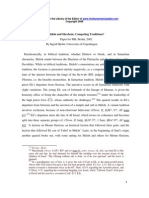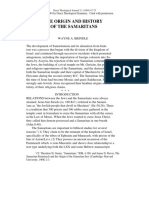The Book of Joshua - Lesson 2 - Study Guide
Uploaded by
Third Millennium MinistriesThe Book of Joshua - Lesson 2 - Study Guide
Uploaded by
Third Millennium Ministries1
The Book of
Joshua
Study Guide
LESSON
TWO VICTORIOUS CONQUEST
2013 by Third Millennium Ministries
For videos, manuscripts, and other resources, visit Third Millennium Ministries at thirdmill.org.
www.thirdmill.org
1
CONTENTS
HOW TO USE THIS LESSON AND STUDY GUIDE ................................................. 2
NOTES ............................................................................................................................... 3
I. INTRODUCTION (0:20) .......................................................................................... 3
II. PREPARATIONS FOR VICTORY, 1:1-18 (2:50)................................................... 3
A. Structure and Content (3:06) ........................................................................................... 3
1. Gods Commands, 1:1-9 (4:13).................................................................................. 3
2. Joshuas Commands, 1:10-15 (4:48).......................................................................... 4
3. Israels Obedience, 1:16-18 (5:17) ............................................................................. 4
B. Original Meaning (5:37) ................................................................................................. 4
1. Divine Authority (6:27).............................................................................................. 4
2. Gods Covenant (7:43) ............................................................................................... 5
3. Standard of Moses Law (9:06) .................................................................................. 5
4. Gods Supernatural Power (9:51) ............................................................................... 6
5. All Israel (12:25) ........................................................................................................ 6
III. VICTORIES OVER TWO CITIES, 2:18:35 (13:19) .............................................. 7
A. Structure and Content (14:19) ......................................................................................... 7
1. City of Jericho, 2:16:27 (15:08) ............................................................................... 7
2. City of Ai, 7:18:29 (21:37)....................................................................................... 9
3. Covenant Renewal, 8:30-35 (24:59) ........................................................................ 11
B. Original Meaning (25:38) ............................................................................................. 11
1. Divine Authority (26:22).......................................................................................... 11
2. Gods Covenant (28:27) ........................................................................................... 12
3. Standard of Moses Law (29:35) .............................................................................. 12
4. Gods Supernatural Power (33:21) ........................................................................... 13
5. All Israel (36:23) ...................................................................................................... 14
IV. VICTORIES OVER TWO ALLIANCES, 9:1-12:24 (38:21) ................................. 14
A. Structure and Content (39:36) ....................................................................................... 14
1. Overview of Alliances, 9:1-2, part 1 (39:54) ........................................................... 14
2. Overview of Victories, 11:16-12:24, part 4 (40:35)................................................. 15
3. Victories over Southern Alliance, 9:3-10:43, part 2 (41:36) .................................... 15
4. Victories over Northern Alliance, 11:1-15, part 3 (43:09) ....................................... 16
B. Original Meaning (44:00) ............................................................................................. 16
1. Divine Authority (44:46).......................................................................................... 16
2. Standard of Moses Law (45:42) .............................................................................. 17
3. Gods Supernatural Power (47:33) ........................................................................... 17
4. All Israel (51:30) ...................................................................................................... 18
V. CHRISTIAN APPLICATION (53:10) .................................................................... 18
A. Inauguration (54:02)...................................................................................................... 18
B. Continuation (1:00:40) .................................................................................................. 20
C. Consummation (1:04:24) .............................................................................................. 21
VI. CONCLUSION (1:08:44)........................................................................................ 22
REVIEW QUESTIONS ................................................................................................. 23
APPLICATION QUESTIONS ...................................................................................... 29
GLOSSARY..................................................................................................................... 30
The Book of Joshua
Lesson 2: Victorious Conquest
2017 by Third Millennium Ministries www.thirdmill.org
2
HOW TO USE THIS LESSON AND STUDY GUIDE
This study guide is designed for use in conjunction with the associated video lesson. If
you do not have access to the video, the study guide will also work with the audio and/or
text versions of the lesson. Additionally, the lesson and study guide are intended to be
used in a learning community, but they also can be used for individual study if necessary.
Before you watch the lesson
o Prepare Complete any recommended readings.
o Schedule viewing In the Notes section of the study guide, the lesson
has been divided into sections that correspond to the video. Using the time
codes found in parentheses beside each major division, determine where to
begin and end your viewing session. IIIM lessons are densely packed with
information, so you may also want to schedule breaks. Breaks should be
scheduled at major divisions.
While you are watching the lesson
o Take notes The Notes section of the study guide contains a basic
outline of the lesson, including the time codes for the beginning of each
section and key notes to guide you through the information. Many of the
main ideas are already summarized, but make sure to supplement these
with your own notes. You should also add supporting details that will help
you to remember, describe, and defend the main ideas.
o Record comments and questions As you watch the video, you may
have comments and/or questions on what you are learning. Use the
margins to record your comments and questions so that you can share
these with the group following the viewing session.
o Pause/replay portions of the lesson You may find it helpful to pause
or replay the video at certain points in order to write additional notes,
review difficult concepts, or discuss points of interest.
After you watch the lesson
o Complete Review Questions Review Questions are based on the basic
content of the lesson. You should answer Review Questions in the space
provided. These questions should be completed individually rather than in
a group.
o Answer/discuss Application Questions Application Questions are
questions relating the content of the lesson to Christian living, theology,
and ministry. Application questions are appropriate for written
assignments or as topics for group discussions. For written assignments, it
is recommended that answers not exceed one page in length.
The Book of Joshua
Lesson 2: Victorious Conquest
2017 by Third Millennium Ministries www.thirdmill.org
3
Notes
I. Introduction (0:20)
The book of Joshua was written about Israels victorious conquest, tribal
inheritances and covenant loyalty in Joshuas day to address similar challenges
facing later generations.
The first major division addresses the original audiences challenges associated
with warfare by drawing attention to Israels victorious conquest over Canaan.
II. Preparations for Victory, 1:1-18 (2:50)
A. Structure and Content (3:06)
The book opens with God commanding Joshua to prepare to lead Israel
westward into victory over the land of Canaan.
1. Gods Commands, 1:1-9 (4:13)
Arise, go over this Jordan, you and all this people (1:2).
Be strong and courageous (1:6, 7, 9).
The Book of Joshua
Lesson 2: Victorious Conquest
2017 by Third Millennium Ministries www.thirdmill.org
Notes 4
2. Joshuas Commands, 1:10-15 (4:48)
Prepare your provisions (1:11).
All the men of valor [among the Transjordan tribes]
shall pass over (1:14).
3. Israels Obedience, 1:16-18 (5:17)
The tribes unanimously committed themselves to loyal
service.
Wherever you send us we will go (1:16).
B. Original Meaning (5:37)
Five themes appear throughout the book of Joshua:
1. Divine Authority (6:27)
The author of Joshua stressed the divine authority behind Israels
preparations:
The phrase the Lord said to Joshua established that God
was the authority behind Joshuas commands (1:1).
God authorized Joshua as Moses successor (1:5).
Israel responded, Just as we obeyed Moses in all things, so
we will obey you (1:17).
The Book of Joshua
Lesson 2: Victorious Conquest
2017 by Third Millennium Ministries www.thirdmill.org
Notes 5
2. Gods Covenant (7:43)
Joshuas preparations for victory highlighted the importance of
Gods covenant:
Israel was not simply to receive Canaan, but to inherit it
(1:6).
God swore to their fathers (1:6) to give them the land
(cf., Genesis 15).
Gods covenant with Israels ancestors established that
Canaan belonged not only to Israel in Joshuas day, but
also to the original audience.
3. Standard of Moses Law (9:06)
Observing Moses law was necessary for Israel to have victory in
warfare and to possess the Promised Land:
[Be] careful to do according to all the law that Moses my
servant commanded you that you may have good
success (1:7).
Obedience to Moses law would lead to victory;
disobedience would lead to defeat.
The Book of Joshua
Lesson 2: Victorious Conquest
2017 by Third Millennium Ministries www.thirdmill.org
Notes 6
4. Gods Supernatural Power (9:51)
Gods supernatural power made the conquest of Canaan possible:
I will be with you (1:5).
The Lord your God is with you wherever you go (1:9).
Gods being with his people in battle meant he would
fight alongside and for them with supernatural power (2
Chronicles 20:17).
Only if God fought alongside and for Israel could they hope
to succeed.
5. All Israel (12:25)
The opening chapter of Joshua introduces the importance of the
participation of all Israel:
All the men of valor shall pass over (1:14).
Whoever rebels against your commandment shall be
put to death (1:18).
If the original audience hoped to have full success in the
conflicts they faced, all of Israel must stand as one people.
The Book of Joshua
Lesson 2: Victorious Conquest
2017 by Third Millennium Ministries www.thirdmill.org
Notes 7
III. Victories over Two Cities, 2:18:35 (13:19)
A. Structure and Content (14:19)
Joshua led Israel to victory over both Jericho and Ai, but the paths to
victory were very different.
1. City of Jericho, 2:16:27 (15:08)
a. Joshuas Spies & Rahab (opening), 2:1-24
Joshua sent spies to investigate Jericho.
Rahab protected the spies and received a solemn
promise of safety.
The spies returned to Joshua with confidence that
God was going to give Israel victory.
b. Joshuas Spies & Rahab (closing), 6:22-27
The closing of the story of Jericho parallels the opening.
Joshua ordered the spies to honor their oath of
protection for Rahab.
Rahab and her family were adopted into Israel.
By starting and ending with Rahab and the spies, everything that
occurs in Joshua 2:16:27 becomes part of the battle for Jericho.
The Book of Joshua
Lesson 2: Victorious Conquest
2017 by Third Millennium Ministries www.thirdmill.org
Notes 8
c. Miraculous Crossing of the Jordan, 3:1-5:12
Israel made ceremonial preparations, highlighting
their devotion to God and Gods approval.
The priests stepped into the river with the ark of the
covenant, and the Jordan parted.
Halfway across, twelve men piled twelve stones
next to the priests.
After the crossing, the twelve stones were erected as
a memorial at Gilgal.
Paralleling the ceremonial preparations, Joshua
consecrated the Israelites.
Israel observed Passover and ate the produce of
Canaan for the first time.
d. Miraculous Fall of Jericho, 5:13-6:21
Joshua met an angelic figure who assured him of
the support of heavens army.
God gave instructions for the attack on Jericho.
Israel obeyed all of Gods directives.
The Book of Joshua
Lesson 2: Victorious Conquest
2017 by Third Millennium Ministries www.thirdmill.org
Notes 9
Joshua ordered that Jericho and everything in it be
devoted to the Lord for destruction (6:17).
To be devoted translates the Hebrew term
charam:
o Outside of war the permanent dedication of
people, animals, or land to services of
worship (Leviticus 27:28)
o In the context of war killing animals and
people and devoting select precious metals to
the Tabernacle
The inhabitants of Canaan were devoted to God as
an act of worship acknowledging that the victory
was Gods (Deuteronomy 20:16).
2. City of Ai, 7:18:29 (21:37)
a. Israels Defeat, 7:1-5
Spies wrongly advised Joshua that Ai would be an
easy victory.
Joshua sent only some of his army.
Achan had secretly kept plunder from Jericho.
Under Gods judgment, 36 Israelites were killed and
the rest were routed.
The Book of Joshua
Lesson 2: Victorious Conquest
2017 by Third Millennium Ministries www.thirdmill.org
Notes 10
b. Israels Repentance, 7:6-26
Joshua lamented to God.
God revealed the reason for Israels defeat.
Achans sin was so egregious that God announced,
Israel has transgressed my covenant (7:11).
Achan, his family, and all that he had were
devoted to destruction, as God had commanded.
c. Israels Victory, 8:1-29
God instructed Joshua to set up an ambush.
Joshua commanded the people accordingly.
The people obeyed.
God gave Israel victory through supernatural
intervention.
The Book of Joshua
Lesson 2: Victorious Conquest
2017 by Third Millennium Ministries www.thirdmill.org
Notes 11
3. Covenant Renewal, 8:30-35 (24:59)
Israel traveled to Mount Ebal and Mount Gerizim in the
heart of the Promised Land (Deuteronomy 11:29).
Joshua read all of Moses law, and the entire nation
renewed their commitment to obey Gods covenant.
B. Original Meaning (25:38)
The original audience was to apply the lessons of Jericho and Ai in ways
that were appropriate for their own day.
1. Divine Authority (26:22)
The author of Joshua emphasized the divine authority behind the
events in these chapters:
The phrase, the Lord said to Joshua established Gods
authority over everything Joshua commanded the people to
do (3:7; 6:2; 7:10; 8:1, 18).
Joshua was Moses successor (4:14, 23; 5:15).
The Book of Joshua
Lesson 2: Victorious Conquest
2017 by Third Millennium Ministries www.thirdmill.org
Notes 12
2. Gods Covenant (28:27)
Israels initial victories reinforced that Gods covenant established
Canaan as Israels homeland (2:9, 24; 5:6; 6:16).
References to Gods covenant assured the original audience of
their divine right to the Promised Land.
3. Standard of Moses Law (29:35)
Obedience to Moses law was necessary for victory in battle (4:10,
12; 5:2, 10; 6:22, 24).
Disobedience to Moses law explained the defeat at Ai (7:1, 13,
15; 22:20).
Israels covenant renewal after Israels victories emphasized the
standard of Moses law (8:31-33).
The Book of Joshua
Lesson 2: Victorious Conquest
2017 by Third Millennium Ministries www.thirdmill.org
Notes 13
4. Gods Supernatural Power (33:21)
Israels initial victories highlighted Gods supernatural power:
God displayed supernatural power against Israels enemies
by striking fear into their hearts (Joshua 2:9, 24; 5:1; Deut.
11:22-25).
God declared, I will be with you, indicating that he was
fighting with supernatural power for Israel (3:7, 10).
The fall of Jericho illustrates Gods supernatural power:
o The wall of Jericho fell down flat (6:20).
o The Lord was with Joshua (6:27).
Gods supernatural power wasnt present in Israels battle
with Ai until Israel repented and dealt with Achans sin
(7:5, 12; 8:18).
The original audience could not win their battles in human
strength; victory came only through Gods supernatural power.
The Book of Joshua
Lesson 2: Victorious Conquest
2017 by Third Millennium Ministries www.thirdmill.org
Notes 14
5. All Israel (36:23)
Israels victories over Jericho and Ai emphasized the importance
of all Israels participation in the conquest (3:1, 17; 4:14):
The twelve men and the twelve stones at the crossing
of the Jordan represented the twelve tribes of Israel (4:4,
4:8-9, 20).
The whole nation of Israel was circumcised at Gilgal (5:8).
God commanded Joshua to march with all the men of
war at the fall of Jericho (6:3).
When only some went to Ai, they were defeated, but with
all Israels participation, they had victory (7:3, 23-25).
All Israel stood before God at the covenant renewal (8:33).
IV. Victories over Two Alliances, 9:1-12:24 (38:21)
Alliances formed against Joshua from all over Canaan, first in the south and then
in the north.
A. Structure and Content (39:36)
This section divides into four main parts:
1. Overview of Alliances, 9:1-2 (39:54)
All the kings who were beyond the Jordan gathered together as
one to fight against Joshua and Israel (9:1, 2).
The Book of Joshua
Lesson 2: Victorious Conquest
2017 by Third Millennium Ministries www.thirdmill.org
Notes 15
2. Overview of Victories, 11:16-12:24 (40:35)
Joshua destroyed all that God had commanded him to destroy, and
God gave Israel rest from war (11:16-23).
This division ends with a list of kings and lands that Israel acquired
through victories (12:1-24).
3. Victories over Southern Alliance, 9:3-10:43 (41:36)
Gibeonite treaty (9:3-27)
o Gibeonites from within Canaan deceived Israel into
making a peace treaty.
o Treaty prompted a large-scale conflict in the
southern region.
initial southern victory (10:1-15)
o An alliance of five southern kings attacked the
Gibeonites.
o Israel was obligated to help the Gibeonites.
o God gave Joshua a miraculous victory.
widespread southern victories (10:16-43)
Joshua had victories in various places over the entire
southern alliance (10:40).
The Book of Joshua
Lesson 2: Victorious Conquest
2017 by Third Millennium Ministries www.thirdmill.org
Notes 16
4. Victories over Northern Alliance, 11:1-15 (43:09)
The king of Hazor formed an alliance against Israel
consisting of a great horde (11:1-11).
God gave Israel victory over the northern alliance.
Joshua won decisive victories throughout the northern
region (11:12-15).
B. Original Meaning (44:00)
The original audience faced enemies with sizable armies, so the author of
Joshua focused on Joshuas large-scale victories.
1. Divine Authority (44:46)
Divine authority undergirded Joshuas victories over alliances
(10:8; 11:9).
Joshuas victories offered guidance as the original audience faced
conflicts in their own day.
The Book of Joshua
Lesson 2: Victorious Conquest
2017 by Third Millennium Ministries www.thirdmill.org
Notes 17
2. Standard of Moses Law (45:42)
Israels victories over two alliances emphasized the standard of
Moses law:
Joshua followed Moses law by upholding Israels treaty
with the Gibeonites (9:20).
Joshua obeyed Moses commands when he devoted
everything to destruction in his victories (10:40; 11:12).
Joshua did everything that the Lord commanded Moses
(11:15, 20).
The Israelites needed to be reminded that victories would be theirs
only when they were faithful to Moses law.
3. Gods Supernatural Power (47:33)
Israels victories over two alliances resulted from Gods
supernatural power. God himself:
threw the southern alliance into a panic (10:10)
threw large stones down on them (10:11)
made the sun stand still so that Israel could win the battle
(10:13)
fought for Israel (10:14, 42)
spread fear among the alliance (10:21)
assured Joshua of victory over the northern alliance (11:6)
hardened the hearts of Israels enemies so that they would
be defeated (11:20)
Israels hope for victory against their foes was that God would
intervene on their behalf with supernatural power.
The Book of Joshua
Lesson 2: Victorious Conquest
2017 by Third Millennium Ministries www.thirdmill.org
Notes 18
4. All Israel (51:30)
Throughout his account of Israels victories over two alliances, the
author of Joshua stressed the participation of all Israel:
Joshua went to war with:
o all the mighty men of valor (10:7)
o all the people of war (10:21)
o all the men of Israel (10:24)
o all his warriors (11:7)
All Israel returned from battle with Joshua (10:15, 43).
Five times, the author repeated the phrase, Then Joshua
and all Israel (10:29-38).
The author of Joshua stressed the blessings of being united to call
the original audience to stand together as they faced their enemies.
V. Christian Application (53:10)
A. Inauguration (54:02)
With Jesus first advent, he and his apostles and prophets accomplished
even more than Joshua did in Gods ongoing conflict against Satan:
They directly confronted and overcame Satan and evil spirits
(Luke 10:18).
Jesus death, resurrection and ascension defeated Satan and evil
spirits (Colossians 2:15, Hebrews 2:14, 15, Ephesians 4:8).
The Book of Joshua
Lesson 2: Victorious Conquest
2017 by Third Millennium Ministries www.thirdmill.org
Notes 19
Jesus inauguration was not Gods time for him to take up arms against
sinful human beings. Instead, Jesus:
warned of Gods coming judgment
offered mercy to all who were willing to surrender to God
Jesus first-century apostles and prophets in the New Testament:
never called for physical attacks on people
spread Jesus gospel message of judgment and salvation:
o warned unbelievers outside the church of Gods coming
judgment
o warned of Gods judgment against false brothers within the
church (1 Corinthians 16:22, Galatians 1:8; cf., Achans
destruction)
o called everyone to repentance so that they could escape
Gods coming wrath
Five main themes fulfilled in the inauguration:
Divine authority The victories of Jesus and his apostles and
prophets were led by divine authority.
Gods covenant The victories of Jesus and his apostles were
rooted in the new covenant.
Standard of Moses law The successes of Jesus and his apostles
depended on their obedience to Moses and Gods fuller revelation
after Moses.
The Book of Joshua
Lesson 2: Victorious Conquest
2017 by Third Millennium Ministries www.thirdmill.org
Notes 20
Gods supernatural power The victories of Jesus and his apostles
depended on Gods supernatural power.
All Israel
o Jesus called people throughout Israel to join with him.
o At Pentecost, Jews from all over the world joined with him
in his battle against evil.
o Jesus apostles and prophets added large numbers of
Gentiles to the early church.
B. Continuation (1:00:40)
During the continuation of his kingdom, Jesus has successfully advanced
his worldwide conquest through his church to nearly every nation on earth.
The New Testament calls on the church, despite its failures, to advance the
cause of Christ in the power of his Spirit day by day. We are to:
continue in spiritual warfare by fully engaging Satan and evil
spirits (Ephesians 6:13-18)
continue to engage human beings as Jesus and his apostles did:
o oppose those who resist the ways of Christ, but not with
physical attacks
o proclaim the judgment and mercy of the Christian gospel
The Book of Joshua
Lesson 2: Victorious Conquest
2017 by Third Millennium Ministries www.thirdmill.org
Notes 21
Applying the five themes of Joshuas conquest to our daily lives:
Divine authority We are to be led by divine authority as we
advance Christs kingdom.
Gods covenant We can have even more confidence for victory
than Joshua did because of the new covenant in Christ.
Standard of Moses law Success in our Christian battles depends
on our submission to the standard of all of Scripture.
Gods supernatural power Our victories today come only through
the supernatural power of Gods Spirit at work.
All Israel We are to fight our battles today as one people from
every tribe and language and nation.
C. Consummation (1:04:24)
The record of Joshua strengthens our hopes for the day when Christ
returns at the consummation of his kingdom.
When Jesus returns, he will come back as a victorious king (Revelation
19:11).
Jesus final victory will bring to fruition the ultimate hope of Christs
worldwide conquest:
Jesus will supersede every act of destruction and every positive
benefit from Joshuas day.
The Book of Joshua
Lesson 2: Victorious Conquest
2017 by Third Millennium Ministries www.thirdmill.org
Notes 22
Satan will be utterly defeated and will have no power to deceive or
harm us anymore (Romans 16:20).
Gods mercy toward rebellious humans will end (Revelation 21:8).
Everyone who has surrendered to Christ will enjoy the glorious
victory of eternal salvation in the new heaven and new earth.
The five main themes in the consummation of the kingdom:
Divine authority Gods authority will direct the great and terrible
day of Jesus return.
Gods covenant The final victory of Christ is certain because of
Gods solemn vow in the new covenant.
Standard of Moses law Jesus final victory will succeed because
he is without flaw.
Gods supernatural power Jesus return will be the greatest
display of Gods supernatural power that the world has ever seen.
All Israel When Christ returns, Gods people from every tribe
and nation on earth will be one in celebration of his great victory.
VI. Conclusion (1:08:44)
The Book of Joshua
Lesson 2: Victorious Conquest
2017 by Third Millennium Ministries www.thirdmill.org
23
Review Questions
1. The account of Israels preparations for victory introduces the appropriate chain
of command for every upcoming battle in the book of Joshua. Describe this chain
of command, and cite some commands and responses that appear in this part of
the book.
2. What five main themes appear throughout the book of Joshua? Give an example
of each theme in relation to Israels preparations for victory. Use specific
Scripture references to support your examples.
The Book of Joshua
Lesson 2: Victorious Conquest
2017 by Third Millennium Ministries www.thirdmill.org
Review Questions 24
3. Describe the battle for Jericho starting and ending with Joshuas spies and Rahab
and including the miraculous events that occurred between these two bookends.
What does it mean that the city and everything in it were devoted to
destruction?
4. Describe the events leading up to Israels victory over the city of Ai. Why was
Israels first attempt to take the city unsuccessful?
The Book of Joshua
Lesson 2: Victorious Conquest
2017 by Third Millennium Ministries www.thirdmill.org
Review Questions 25
5. What event followed the victories over Jericho and Ai? Where did this event take
place, and what did the Israelites do there?
6. The same five themes appear in the account of Israels victories over two cities
that appeared in the account of Israels preparations for victory. Give an example
of each theme in relation to Israels victories over Jericho and Ai. Use specific
Scripture references to support your examples.
The Book of Joshua
Lesson 2: Victorious Conquest
2017 by Third Millennium Ministries www.thirdmill.org
Review Questions 26
7. Describe both the southern and northern alliances that formed against Israel in
Joshuas day. How did the Gibeonite treaty lead to Israels conflict with a
southern alliance?
8. Four of the five main themes in the book of Joshua are highlighted in the account
of Israels victories over two alliances. How do we see these four themes reflected
in the events of this section?
The Book of Joshua
Lesson 2: Victorious Conquest
2017 by Third Millennium Ministries www.thirdmill.org
Review Questions 27
9. During the inauguration of his kingdom, how did Jesus and his apostles and
prophets extend Gods victory over Satan and those who follow him? How did
this approach differ from Joshuas victorious conquest?
10. What two general strategies does the New Testament call the church to engage in
as we advance Christs worldwide conquest during the continuation of his
kingdom?
The Book of Joshua
Lesson 2: Victorious Conquest
2017 by Third Millennium Ministries www.thirdmill.org
Review Questions 28
11. What will happen in the final victorious conquest at the consummation of Christs
kingdom? How will this compare to the conquest of Joshuas day?
The Book of Joshua
Lesson 2: Victorious Conquest
2017 by Third Millennium Ministries www.thirdmill.org
29
Application Questions
1. One of the biggest objections modern people have to the book of Joshua is Gods call
to completely destroy every living thing in Canaan. How might you answer someone
who is struggling to reconcile a good God with the God who ordered the Canaanites
total destruction?
2. Read Hebrews 11:31 and James 2:25. How does the New Testaments reflection on
Rahabs life encourage you as a Christian today?
3. Obeying the standard of Moses law was essential for Joshua, Israel and even Jesus.
What does this mean for us? Why do we need to obey God if hes already given us
grace and forgiveness?
4. God saved Israel time after time by his supernatural power. Do you believe he still
uses this supernatural power today? If so, how?
5. How does the theme of all Israel relate to Christians today? How should this shape
the way we view the worldwide church, particularly the persecuted church?
6. Because of his sin, even the Israelite Achan was devoted to destruction. What are
some of the consequences for deliberate sin in the Christian life today?
7. Jesus didnt bring the final victorious conquest at his first advent. How can someone
who is suffering or mourning take real comfort in an incomplete, but promised,
victory?
8. As we live in the continuation of Christs kingdom, what does spiritual warfare look
like in the following three realms: your life, your country, the world?
9. Jesuss return will at once be joyous and terrifying, and he will enact perfect justice.
If you knew Jesus would return tonight, how would you spend the rest of the day?
What does this choice say about how you should spend the remainder of your life?
10. What is the most significant thing you learned in this lesson?
The Book of Joshua
Lesson 2: Victorious Conquest
2017 by Third Millennium Ministries www.thirdmill.org
30
Glossary
Achan Israelite who secretly kept plunder from Gilgal Literally circle of stones; name
the defeat of Jericho and brought a curse on Israel; associated with several biblical places, including
as a result, he and everything associated with him where the Israelites camped after crossing the
were destroyed Jordan River and where Saul was rejected as king
after ignoring Gods commands
Ai Canaanite city near Beth Aven; conquered by
Joshua and the Israelites only after Israel repented inauguration First stage in inaugurated
of their disloyalty to God eschatology; refers to Christ's first coming and the
ministries of his apostles and prophets
anathema A strong curse or a person or thing
that is despised or cursed (originally from the Jericho Canaanite city that was conquered by
Greek language) Joshua and the Israelites through Gods miraculous
intervention
ark of the covenant A box made (as per Gods
command to Moses) of acacia wood and overlaid Jordan River River in the Middle East flowing
with gold where the stone tablets of the Ten between the Sea of Galilee and the Dead Sea;
Commandments were kept known in biblical history for parting when Joshua
and the Israelites crossed into the Promised Land,
Canaan, land of Region given to Abraham and and as the place of Jesus baptism
his descendants as an inheritance in his covenant
with God; encompasses present-day Israel, the Joshua Leader of Israel after the death of Moses
Palestinian Territories, Lebanon, Jordan, the who brought the Israelites into the Promised Land
adjoining coastal lands and parts of Egypt and Syria and faithfully distributed Israels tribal inheritances
Canaanites People descended from Canaan, the Moses Old Testament prophet and deliverer who
son of Ham, who lived in the land of Canaan before led the Israelites out of Egypt; man with whom God
Joshua's conquest made a national "covenant of law" and who
administered the Ten Commandments and the Book
charam Hebrew verb (transliteration) meaning of the Covenant to the Israelites; also appeared with
to devote wholly to the Lord or to destroy in Elijah at Jesus' transfiguration
devotion to the Lord
Mount Ebal Mountain in the heart of the
cherem Hebrew noun (transliteration) meaning Promised Land near Mount Gerizim and Shechem
devoted or dedicated thing or utter destruction where Israel renewed their covenant with God in
the days of Joshua
Cisjordan The lands to the west of the Jordan
River (lit. beside the Jordan) that God promised Mount Gerizim Mountain in the heart of the
to Israel as an inheritance Promised Land near Mount Ebal and Shechem
where Israel renewed their covenant with God in
consummation Third and final stage of the days of Joshua
inaugurated eschatology when Christ will return
and fulfill God's ultimate purpose for all of history nachal Hebrew verb (transliteration) meaning to
inherit
continuation Second or middle stage of
inaugurated eschatology; the period of the kingdom new covenant The covenant of fulfillment in
of God after Christ's first advent but before the final Christ; first mentioned in Jeremiah 31:31
victory
Promised Land The land that God promised to
covenant A binding legal agreement made give as an inheritance to Abraham and his
between two people or groups of people, or descendants
between God and a person or group of people
Rahab Gentile woman who helped the spies
false brothers Unbelievers within the church when they entered the Promised Land; included as
a part of the people of Israel after the conquest of
Gibeonites Inhabitants of the Canaanite city of Jericho
Gibeon who tricked the Israelites into making a
treaty with them Transjordan The lands to the east of the Jordan
River (lit. across the Jordan) where the tribes of
Reuben, Gad, and half of the tribe of Manasseh
received permission to settle
The Book of Joshua
Lesson 2: Victorious Conquest
2017 by Third Millennium Ministries www.thirdmill.org
You might also like
- Mark 11 Bible Study (Tim Keller) - The Final TempleNo ratings yetMark 11 Bible Study (Tim Keller) - The Final Temple3 pages
- The Samaritan Mission in Acts (The Library of New Testament Studies, Vol. 328) (V. J. Samkutty) (Z-Library)No ratings yetThe Samaritan Mission in Acts (The Library of New Testament Studies, Vol. 328) (V. J. Samkutty) (Z-Library)277 pages
- The Book of Joshua - Lesson 1 - StudyGuideNo ratings yetThe Book of Joshua - Lesson 1 - StudyGuide32 pages
- Homiletical Commentary On The Book of Deuteronomy 1000285173No ratings yetHomiletical Commentary On The Book of Deuteronomy 1000285173441 pages
- The Pentateuch - Lesson 9 - Study GuideNo ratings yetThe Pentateuch - Lesson 9 - Study Guide27 pages
- The Book of Joshua - Lesson 4 - Transcript100% (1)The Book of Joshua - Lesson 4 - Transcript24 pages
- Building Your Theology - Lesson 3 - Transcript100% (1)Building Your Theology - Lesson 3 - Transcript22 pages
- The Pentateuch - Lesson 1 - Study GuideNo ratings yetThe Pentateuch - Lesson 1 - Study Guide24 pages
- What Is Man - Lesson 4 - Forum TranscriptNo ratings yetWhat Is Man - Lesson 4 - Forum Transcript20 pages
- Building Biblical Theology - Lesson 4 - TransciptNo ratings yetBuilding Biblical Theology - Lesson 4 - Transcipt28 pages
- The Heart of Paul's Theology - Lesson 2 - Study Guide100% (1)The Heart of Paul's Theology - Lesson 2 - Study Guide25 pages
- Building Biblical Theology - Lesson 2 - Forum TranscriptNo ratings yetBuilding Biblical Theology - Lesson 2 - Forum Transcript31 pages
- The Epistle of James - Lesson 1 - Transcript100% (1)The Epistle of James - Lesson 1 - Transcript26 pages
- Bible Commentary On MARK & PETER by Bob UtleyNo ratings yetBible Commentary On MARK & PETER by Bob Utley343 pages
- Building Biblical Theology - Lesson 1 - Transcript100% (1)Building Biblical Theology - Lesson 1 - Transcript27 pages
- Building Biblical Theology - Lesson 1 - Study Guide100% (1)Building Biblical Theology - Lesson 1 - Study Guide29 pages
- Paul's Prison Epistles - Lesson 3 - Study GuideNo ratings yetPaul's Prison Epistles - Lesson 3 - Study Guide34 pages
- Your Kingdom Come: The Doctrine of Eschatology - Lesson 2 - TranscriptNo ratings yetYour Kingdom Come: The Doctrine of Eschatology - Lesson 2 - Transcript29 pages
- Hermeneutics: "Meaning" Is Determined by The Author It Is Discovered by Readers100% (1)Hermeneutics: "Meaning" Is Determined by The Author It Is Discovered by Readers7 pages
- Paul's Prison Epistles - Lesson 2 - Forum Transcript100% (1)Paul's Prison Epistles - Lesson 2 - Forum Transcript22 pages
- He Gave Us Prophets - Lesson 8 - Forum TranscriptNo ratings yetHe Gave Us Prophets - Lesson 8 - Forum Transcript22 pages
- Sermon Notes: "The Covenant of Marriage" (Genesis 1:26-28 & 2:18-25)0% (1)Sermon Notes: "The Covenant of Marriage" (Genesis 1:26-28 & 2:18-25)4 pages
- Overview of Church History - Dr. W. Robert Godfrey100% (2)Overview of Church History - Dr. W. Robert Godfrey14 pages
- We Believe in God - Lesson 1 - Study GuideNo ratings yetWe Believe in God - Lesson 1 - Study Guide23 pages
- The Authorship of Ezra and Nehemiah in Light of Differences in Their Ideological BackgroundNo ratings yetThe Authorship of Ezra and Nehemiah in Light of Differences in Their Ideological Background28 pages
- The Four Cups of Passover in The New Testament0% (1)The Four Cups of Passover in The New Testament5 pages
- How Interpret The Bible: Partners in Hope Preachers Workshop 16 DECEMBER, 2017100% (1)How Interpret The Bible: Partners in Hope Preachers Workshop 16 DECEMBER, 201721 pages
- The Son of Man Came To Serve: Matthew 20:17-34No ratings yetThe Son of Man Came To Serve: Matthew 20:17-3427 pages
- An Introduction To Luther Calvin and Their ProtestNo ratings yetAn Introduction To Luther Calvin and Their Protest25 pages
- Search The Scriptures Chapter Analysis FormatNo ratings yetSearch The Scriptures Chapter Analysis Format3 pages
- Expository Preaching - Toward An Exegetical Theology Exams100% (2)Expository Preaching - Toward An Exegetical Theology Exams27 pages
- Building Systematic Theology - Lesson 1 - TranscriptNo ratings yetBuilding Systematic Theology - Lesson 1 - Transcript30 pages
- Building Systematic Theology - Lesson 2 - Transcript100% (2)Building Systematic Theology - Lesson 2 - Transcript27 pages
- Building Your Theology - Lesson 4 - TranscriptNo ratings yetBuilding Your Theology - Lesson 4 - Transcript24 pages
- The Biblical Doctrine of The Trinity - Lesson 2 - Forum TranscriptNo ratings yetThe Biblical Doctrine of The Trinity - Lesson 2 - Forum Transcript21 pages
- We Believe in The Holy Spirit - Lesson 2 - Study GuideNo ratings yetWe Believe in The Holy Spirit - Lesson 2 - Study Guide26 pages
- We Believe in The Holy Spirit - Lesson 3 - Study GuideNo ratings yetWe Believe in The Holy Spirit - Lesson 3 - Study Guide27 pages
- John J. Collins (1980) - The Epic of Theodotus and The Hellenism of The Hasmoneans. The Harvard Theological Review 73.1, Pp. 91-104No ratings yetJohn J. Collins (1980) - The Epic of Theodotus and The Hellenism of The Hasmoneans. The Harvard Theological Review 73.1, Pp. 91-10415 pages
- The Modern Traveller: Maundrel's Travels to Jerusalem. Shaw's Travels to the Levant. Description of Palmyra. Pococke's Description of the East. Drummond's Travels to Greece. Keysler's Travels into GermanyNo ratings yetThe Modern Traveller: Maundrel's Travels to Jerusalem. Shaw's Travels to the Levant. Description of Palmyra. Pococke's Description of the East. Drummond's Travels to Greece. Keysler's Travels into Germany298 pages
- John P. Meier (2000) - The Historical Jesus and The Historical Samaritans. What Can Be Said - Biblica 81.2, Pp. 202-232No ratings yetJohn P. Meier (2000) - The Historical Jesus and The Historical Samaritans. What Can Be Said - Biblica 81.2, Pp. 202-23232 pages
- What Is A Variant? Announcing A Dead Sea Scrolls Fragment of DeuteronomyNo ratings yetWhat Is A Variant? Announcing A Dead Sea Scrolls Fragment of Deuteronomy10 pages
- Christian Ideals Loving God and Loving NeighborNo ratings yetChristian Ideals Loving God and Loving Neighbor6 pages
- The Presence of Local Deities On Roman Palestinian Coins: Reflections On Cultural and Religious Interaction Between Romans and Local Elites / Vagner Carvalheiro Porto100% (1)The Presence of Local Deities On Roman Palestinian Coins: Reflections On Cultural and Religious Interaction Between Romans and Local Elites / Vagner Carvalheiro Porto29 pages
- Handbook of High Field Dynamic Nuclear Polarization 1st Edition Vladimir K. Michaelis (Editor) instant download100% (1)Handbook of High Field Dynamic Nuclear Polarization 1st Edition Vladimir K. Michaelis (Editor) instant download40 pages
- Ginzberg, The Legends of The Jews, Vol. 4 OCR PDFNo ratings yetGinzberg, The Legends of The Jews, Vol. 4 OCR PDF468 pages
- (FREE PDF Sample) (Test Bank) Management of Information Security 5th Whitman Ebooks100% (2)(FREE PDF Sample) (Test Bank) Management of Information Security 5th Whitman Ebooks34 pages
- Enduring Word Bible Commentary Joshua Chapter 8No ratings yetEnduring Word Bible Commentary Joshua Chapter 89 pages
- Mark 11 Bible Study (Tim Keller) - The Final TempleMark 11 Bible Study (Tim Keller) - The Final Temple
- The Samaritan Mission in Acts (The Library of New Testament Studies, Vol. 328) (V. J. Samkutty) (Z-Library)The Samaritan Mission in Acts (The Library of New Testament Studies, Vol. 328) (V. J. Samkutty) (Z-Library)
- Homiletical Commentary On The Book of Deuteronomy 1000285173Homiletical Commentary On The Book of Deuteronomy 1000285173
- The Heart of Paul's Theology - Lesson 2 - Study GuideThe Heart of Paul's Theology - Lesson 2 - Study Guide
- Building Biblical Theology - Lesson 2 - Forum TranscriptBuilding Biblical Theology - Lesson 2 - Forum Transcript
- Building Biblical Theology - Lesson 1 - TranscriptBuilding Biblical Theology - Lesson 1 - Transcript
- Building Biblical Theology - Lesson 1 - Study GuideBuilding Biblical Theology - Lesson 1 - Study Guide
- Your Kingdom Come: The Doctrine of Eschatology - Lesson 2 - TranscriptYour Kingdom Come: The Doctrine of Eschatology - Lesson 2 - Transcript
- Hermeneutics: "Meaning" Is Determined by The Author It Is Discovered by ReadersHermeneutics: "Meaning" Is Determined by The Author It Is Discovered by Readers
- Paul's Prison Epistles - Lesson 2 - Forum TranscriptPaul's Prison Epistles - Lesson 2 - Forum Transcript
- Sermon Notes: "The Covenant of Marriage" (Genesis 1:26-28 & 2:18-25)Sermon Notes: "The Covenant of Marriage" (Genesis 1:26-28 & 2:18-25)
- Overview of Church History - Dr. W. Robert GodfreyOverview of Church History - Dr. W. Robert Godfrey
- The Authorship of Ezra and Nehemiah in Light of Differences in Their Ideological BackgroundThe Authorship of Ezra and Nehemiah in Light of Differences in Their Ideological Background
- How Interpret The Bible: Partners in Hope Preachers Workshop 16 DECEMBER, 2017How Interpret The Bible: Partners in Hope Preachers Workshop 16 DECEMBER, 2017
- An Introduction To Luther Calvin and Their ProtestAn Introduction To Luther Calvin and Their Protest
- Expository Preaching - Toward An Exegetical Theology ExamsExpository Preaching - Toward An Exegetical Theology Exams
- Sermons For Those Who Have Become Our Coworkers (V)From EverandSermons For Those Who Have Become Our Coworkers (V)
- Building Systematic Theology - Lesson 1 - TranscriptBuilding Systematic Theology - Lesson 1 - Transcript
- Building Systematic Theology - Lesson 2 - TranscriptBuilding Systematic Theology - Lesson 2 - Transcript
- The Biblical Doctrine of The Trinity - Lesson 2 - Forum TranscriptThe Biblical Doctrine of The Trinity - Lesson 2 - Forum Transcript
- We Believe in The Holy Spirit - Lesson 2 - Study GuideWe Believe in The Holy Spirit - Lesson 2 - Study Guide
- We Believe in The Holy Spirit - Lesson 3 - Study GuideWe Believe in The Holy Spirit - Lesson 3 - Study Guide
- John J. Collins (1980) - The Epic of Theodotus and The Hellenism of The Hasmoneans. The Harvard Theological Review 73.1, Pp. 91-104John J. Collins (1980) - The Epic of Theodotus and The Hellenism of The Hasmoneans. The Harvard Theological Review 73.1, Pp. 91-104
- The Modern Traveller: Maundrel's Travels to Jerusalem. Shaw's Travels to the Levant. Description of Palmyra. Pococke's Description of the East. Drummond's Travels to Greece. Keysler's Travels into GermanyThe Modern Traveller: Maundrel's Travels to Jerusalem. Shaw's Travels to the Levant. Description of Palmyra. Pococke's Description of the East. Drummond's Travels to Greece. Keysler's Travels into Germany
- John P. Meier (2000) - The Historical Jesus and The Historical Samaritans. What Can Be Said - Biblica 81.2, Pp. 202-232John P. Meier (2000) - The Historical Jesus and The Historical Samaritans. What Can Be Said - Biblica 81.2, Pp. 202-232
- What Is A Variant? Announcing A Dead Sea Scrolls Fragment of DeuteronomyWhat Is A Variant? Announcing A Dead Sea Scrolls Fragment of Deuteronomy
- The Presence of Local Deities On Roman Palestinian Coins: Reflections On Cultural and Religious Interaction Between Romans and Local Elites / Vagner Carvalheiro PortoThe Presence of Local Deities On Roman Palestinian Coins: Reflections On Cultural and Religious Interaction Between Romans and Local Elites / Vagner Carvalheiro Porto
- Handbook of High Field Dynamic Nuclear Polarization 1st Edition Vladimir K. Michaelis (Editor) instant downloadHandbook of High Field Dynamic Nuclear Polarization 1st Edition Vladimir K. Michaelis (Editor) instant download
- (FREE PDF Sample) (Test Bank) Management of Information Security 5th Whitman Ebooks(FREE PDF Sample) (Test Bank) Management of Information Security 5th Whitman Ebooks



































